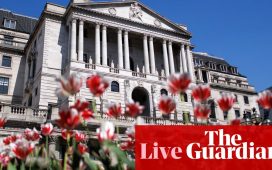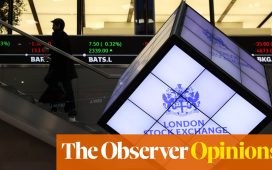UK economy returns to growth
Newsflash: The UK’s short, shallow, recession is over.
The UK economy grew by 0.6% in the first quarter of this year, the Office for National Statistics has reported.
That’s stronger growth than expected.
The ONS says the recovery was driven by the services sector, and industry:
-
In output terms, services grew by 0.7% on the quarter with widespread growth across the sector; elsewhere the production sector grew by 0.8% while the construction sector fell by 0.9%.
-
In expenditure terms, there were increases in the volume of net trade, household spending and government spending, partially offset by falls in gross capital formation.
This rise in GDP means that the economy is no longer in a technical recession, after activity fell in the third and fourth quarters of last year.
Key events
Moody’s Analytics: interest rates will constrain growth this year
High interest rates are likely to weigh on growth this year, even if we do get the two quarter-point cuts which markets expect.
Moody’s Analytics senior economist David Muir explains:
“With inflation moderating, the Bank of England is signalling that a rate cut is on the cards for the summer.
But first the Monetary Policy Committee needs further evidence that wage growth and price pressures within services are easing sufficiently. If that evidence builds quickly, a rate cut could come as soon as June, but we think August is the more likely date.
That said, even as rates are lowered, they will remain a constraint on the pace of economic growth through this year.”
Hunt: very difficult decisions are working….
Chancellor Jeremy Hunt is arguing that the UK’s GDP growth shows that the Government’s decisions are paying off.
He told Sky News this morning:
“We’re seeing that inflation is falling faster and I think people recognise it has been a very, very challenging period but they don’t vote for Conservative governments for us to do popular things, they trust is to do the right thing for the long-term benefit of the economy.”
He told Radio 4’s Today Programme that families who have been through “a really tough time” can see that the “very difficult decisions” taken to get the economy back on its feet after the pandemic and the energ shock” are working.
Hunt also claims that the UK’s longer-term prospects are strong – citing IMF forecasts for faster growth than France, Italy, Germany or Japan over the next six years.
Hunt also disputed that the Conservative’s reputation for economic competence had been crushed by Liz Truss’s mini-budget.
Hunt, who replaced Kwasi Kwarteng after the markets reacted very badly to the Truss administration’s package of unfunded tax cuts, concedes that mistakes were made, but that he corrected them within weeks.
Hunt says:
When interest rates and the prices people pay for mortgages have gone up all across the developed world following the energy shock caused by the invasion of Ukraine, it’s just wrong to attribute that to the mini-budget.
Hunt also predicted that mortgage rates are likely to start to fall, as inflation drops towards the UK’s 2% target – which could allow the Bank of England to lower interest rates.
Is Hunt right, though, that the mini-budget shouldn’t take the blame for the UK’s mortgage shock?
It is true that morgage rates have risen in the US, and in the eurozone, as central banks have tightened monetary policy by raising interest rates.
Looking back, the mini-budget triggered a massive selloff in government bonds – forcing the Bank of England to launch emergency action to halt a run on Britain’s pension funds.
More than two-fifths of Britain’s mortgage deals were withdrawn in the week after the mini-budget, as lenders rushed to reprice them, higher.
UK mortgage rates did fall in 2023, as the shock of the mini-budget subsided, but have been rising in recent weeks on concerns that interest rates might not be cut as soon as hoped (although the BoE suggested yesterday it could cut faster than expected).
So, even if the Truss shock has now dissipated, some unlucky mortage-holders who had to refinance their loan shortly after the mini-budget ended up paying much more…
FTSE 100 hits 8,400 points amid GDP relief
Britain’s blue-chip share index has soared to another all-time high in early trading in London, amid relief that the UK’s recession is over.
The FTSE 100 index has jumped over the 8400 point mark for the first time, hitting a new intraday high of 8425 points – up 45 points this morning.
Mobile network operator Vodafone is the top riser, up 2%, after the UK cabinet office conditionally approved its merger with rival Three (although the competition authorities are yet to give their ruling).
Mining companies are also in the top risers, along with luxury goods maker Burberry (+1.7%), airline easyJet (+1.4%) and housebuilder Berkeley (+1.3%)
Susannah Streeter, head of money and markets at Hargreaves Lansdown, says today’s growth report is lifting confidence:
The 0.6% growth registered in the first three months of the year was higher than forecast, with the green shoots seen in January and February flowering into a stronger growth spurt in March.
Confidence breeds more optimism, and with the economy showing signs of repairing and the FTSE 100 rallying higher, the glass half full sentiment is settling in. The blue-chip index has powered higher in early trade and set fresh records, after a sheen of positivity has descended on the UK.
The FTSE 100 has been on a strong rally since mid-April, and is on track for its third weekly rise in a row. It’s gained almost 9% so far this year.
Hopes that the economy was strengthening, and that interest rates will be cut this year, have both pushed up share values in London in recent weeks.
However, the FTSE 100 isn’t really a barometer of the strength of the UK economy, rather it is an outward-looking index comprising largely of multinational conglomerates.
Victoria Scholar, head of investment at interactive investor, says:
“After the FTSE 100 hit a record high for the fourth straight session on Thursday, the UK index has opened higher yet again and is potentially on track to close at another all-time high.
Shares in Anglo American are up on a report that Rio Tinto also considered a bid following BHP’s rejected offer. M&A speculation is helping to keep Anglo shares supported at the moment.
UK joint-fastest growing G7 country in last quarter
The UK has grown faster than many of its major rivals at the start of this year, as it emerged from recession.
The 0.6% growth recorded in January-March is faster than the US, where GDP rose by 0.4%, Germany (+0.2%), France (+0.2%) or Italy (+0.3%).
Out of the remaining G7 nations, Canada is estimated to have also grown by 0.6% in Q1, while economists predict Japan will have grown by 0.2%.
Since the pandemic, the UK is one of the slower-growing economies, today’s GDP report shows:
Although Simon French, chief economist at Panmure Gordon, reports that the UK is in bronze medal position since 2016:
Living standards recession over as GDP/head grows
Britain’s “living standards recession” is also, finally, over, after a two year squeeze.
Today’s GDP report shows that real GDP per head is estimated to have increased by 0.4% in the first quarter.
This measure of GDP per capita divides UK GDP by the total UK population, to get a more accurate view of how living standards are changing.
GDP per head had fallen steadily through 2023, and indeed hadn’t grown for seven quarters in a row.
Even after rising by 0.4% in January-March, GDP per head is estimated to be 0.7% lower than a year ago.
And for those who like GDP in per capita terms…. Although data comes with two health warnings. Is not standardised measure across G7 so this shouldnt be interpreted precisely. Also UK likely to be revised down later in 2024 as new (higher) population estimates are included. https://t.co/vMzWsYrCVI pic.twitter.com/ma7u7LZQgs
— Simon French (@Frencheconomics) May 10, 2024
TUC: One quarter of decent growth won’t make up for 14 years of “lost living standards”
TUC General Secretary Paul Nowak says:
“The UK economy has stopped shrinking. But one quarter of decent growth won’t make up for 14 years of lost living standards.
The Tories are still presiding over the worst period for economic stagnation and livelihoods in modern history.
Real wages are worth less than in 2008 and working people will end this parliament worse off than at the start.
Workers would be over £10,000 richer if pay had kept pace with its pre-crisis trend.
The Conservatives have succeeded only in making families poorer.”
Recession over: What the experts say
City experts are welcoming the news that Britain’s economy has returned to growth.
Richard Carter, head of fixed interest research at Quilter Cheviot, hopes that the UK’s economic stagnation will subside this year:
“With interest rate cuts seemingly pencilled in for the summer, the good news continues to flow for the UK as today’s data shows the UK is out of recession. The first quarter saw GDP grow by 0.6%, better than expected, as inflation has eased and the worst of the cost-of-living crisis is behind us.
The increase in GDP has primarily been driven by the UK’s strong services sector, which it has come to rely on in recent years to help push the economy forward.
“While growth remains fairly lacklustre compared to the likes of the US, this data shows this should be the year that economic stagnation subsides in the UK and the economy returns to consistent, if unspectacular, growth. It is the unspectacular nature of the growth, however, that is likely to be focus. While the very shallow and short recession appears over, there is a clamour for interest rate cuts to begin in order to stimulate growth and get business moving again. Markets await the first interest rate cut with bated breath, so it will be interesting to see the economic reaction once those rate cuts begin feeding through.
Yael Selfin, chief economist at KPMG UK, believes the worst is over, and that there will be continued growth for the rest of this year.
Falling inflation and real pay increases should help repair some of the damage to household incomes and support households’ consumption. Growth prospects have also improved in Europe, which could spur a recovery in exports.
“Despite the better near-term outlook, the improvement in GDP growth looks likely to be constrained by the ongoing weakness in productivity growth as well as reduced scope to increase employment levels. This could see annual GDP growth in the region of just 1% per year in the medium term.
“UK GDP grew by 0.4% in March, supported by a rise in services output which grew by 0.5%. Forward looking indicators point to further momentum in the coming months, consistent with our view that the worst is behind the UK economy.”
But… Suren Thiru, economics director of ICAEW, says the end of the recesion is a “rather hollow victory”, which could encourage the Bank of England to keep interest rates high for longer…
“These figures confirm an easy exit from the shallowest of recessions for the UK, as lower inflation helped return the economy to growth in the first quarter.
The UK’s escape from recession is a rather hollow victory because the big picture remains one of an economy struggling with stagnation, as poor productivity and high economic inactivity limits our growth potential.
The economy could struggle to kick on further in the second quarter as the boost to people’s incomes from weaker inflation is partly curtailed by renewed caution to spend and invest, amid higher unemployment and ongoing political uncertainty.
The strong exit from recession may inadvertently keep UK interest rates higher for longer by giving those policymakers still worried about underlying inflationary pressures enough comfort on economic conditions to continue putting off cutting rates.”
Rachel Reeves: From no growth to low growth
Labour’s shadow chancellor, Rachel Reeves, has posted that it’s ‘time for change’.
Following this morning’s GDP report, Reeves says:
From no growth to low growth – is that really the scale of the Conservatives’ ambitions?
Food prices are still high, families are paying more on their monthly mortgage bills and working people are worse off.
From no growth to low growth – is that really the scale of the Conservatives’ ambitions?
Food prices are still high, families are paying more on their monthly mortgage bills and working people are worse off.
It is time for change.
— Rachel Reeves (@RachelReevesMP) May 10, 2024
UK contruction sector remains weak
Although most of the economy grew in the last quarter, there are some warning lights flashing in the construction sector.
Construction output fell by 0.9% in January-March, for the second quarter in a row.
That means construction is in recession; output is 0.7% lower than the same quarter a year ago.
The fall reflects a decline in new work of 1.8% driven by private commercial new work, which fell by 5.3%.
However, repair and maintenance increased 0.3%, which the ONS says may be due to housing associations re-directing their budgets towards repairs and upgrading “to deal with problems such as damp arising from tenants using less heating because of the higher cost of living”.
Wet weather this year also dampened construction activity, as the swathe of storms kept workers off building sites.
Nicholas Hyett, investment manager at Wealth Club, says:
Construction remains the one area of weakness, particularly in the commercial sector. That’s no surprise.
Real estate is particularly exposed to the effect of higher interest rates, and the upheaval of the pandemic is still rocking the office and retail sector – with increased home working and online shopping permanently changing demand. That’s not a trend that’s unique to the UK.
Hunt: economy is returning to full health
Chancellor of the Exchequer Jeremy Hunt has hailed the news that Britain’s recession is over, saying:
“There is no doubt it has been a difficult few years, but today’s growth figures are proof that the economy is returning to full health for the first time since the pandemic.
“We’re growing this year and have the best outlook among European G7 countries over the next six years, with wages growing faster than inflation, energy prices falling and tax cuts worth £900 to the average worker hitting bank accounts.”
I hate to burst the chancellor’s bubble, but the UK is also expected to be the worst-performing economy in the G7 next year. Still, these forecasts are there to be beaten….
ONS: Broad-based services growth in the last quarter
ONS director of economic statistics Liz McKeown has told Radio 4’s Today programme that the 0.6% growth recorded in the last quarter is stronger than people expected.
Compared to recent figures, we last saw growth this strong in the last quarter of 2021, McKeown explains.
McKeown pointed to the pick-up in service sector growth, but also pointed out that construction shrank – due to a decline in new work.
McKeown says:
“After two quarters of contraction, the UK economy returned to positive growth in the first three months of this year.
“There was broad-based strength across the service industries with retail, public transport and haulage, and health all performing well. Car manufacturers also had a good quarter. These were only a little offset by another weak quarter for construction.
“In the month of March the economy grew robustly led, again, by services with wholesalers, the health sector and hospitality all doing well.”
UK grew 0.4% in March
Growth in March alone was also stronger than expected.
GDP rose by 0.4% in March, the ONS reports, beating City forecasts for 0.1% growth.
The services sector had a good month, growing by 0.5% in March, while production output grew by 0.2%. Construction output fell by 0.4% in the month, though.
February’s GDP data has been revised higher too, to show growth of 0.2% (up from 0.1% first estimated).
UK economy returns to growth
Newsflash: The UK’s short, shallow, recession is over.
The UK economy grew by 0.6% in the first quarter of this year, the Office for National Statistics has reported.
That’s stronger growth than expected.
The ONS says the recovery was driven by the services sector, and industry:
-
In output terms, services grew by 0.7% on the quarter with widespread growth across the sector; elsewhere the production sector grew by 0.8% while the construction sector fell by 0.9%.
-
In expenditure terms, there were increases in the volume of net trade, household spending and government spending, partially offset by falls in gross capital formation.
This rise in GDP means that the economy is no longer in a technical recession, after activity fell in the third and fourth quarters of last year.
The problems with GDP
GDP is the standard measure of economic activity, but it has its critics too.
It tracks what’s happening across the economy, but does not distinguish between harmful and beneficial activity.
Back in 1968, US presidential candidate Bobby Kennedy issued a magisterial rebuke, saying GDP ‘measures everything except that which is worthwhile’.
Kennedy told the University of Kansas:
It counts special locks for our doors and the jails for the people who break them. It counts the destruction of the redwood and the loss of our natural wonder in chaotic sprawl.
It counts napalm and counts nuclear warheads and armored cars for the police to fight the riots in our cities. It counts Whitman’s rifle and Speck’s knife, and the television programs which glorify violence in order to sell toys to our children.
Yet the gross national product does not allow for the health of our children, the quality of their education or the joy of their play. It does not include the beauty of our poetry or the strength of our marriages, the intelligence of our public debate or the integrity of our public officials.
You can hear the speech here.
In order to measure GDP, statisticians use three approaches: measuring the total value of goods and services produced; the total amount spent in the economy, and the total amount of income from profits and wages.
All three methods should, in theory, give the same number.
The Bank of England is confident that the UK recession has ended.
Yesterday, the BoE said UK GDP is expected to have risen by 0.4% in the first quarter of this year, explaining:
UK GDP growth had strengthened since the start of the year, reversing the fall in output that was estimated to have occurred in the second half of 2023.
The [Monetary Policy] Committee expected the recovery in output to be underpinned by a pickup in household consumption, supported by higher real incomes.
Introduction: UK GDP report to show if economy has escaped recession
Good morning. We’re about to discover if Britain’s economy has clambered out of recession.
New gross domestic product (GDP) figures for the first three months of this year are released at 7am, and City economists are hopeful that the economy expanded in the quarter.
If so, that would mean that the shallow recession that began in the second half of last year has ended.
A technical recession, in City jargon, is at least two quarterly falls in GDP in a row. As things stand (and data are often revised…) the UK economy shrank by 0.1% in July-September 2023, and then by 0.3% in October-December as consumer spending slumped, triggering the technical recession declared earlier this year.
Analysts are expecting to learn that UK GDP rose by around 0.4% in the January to March quarter, which would consign the recession to history.
Recent falls in inflation, and hopes that interest rates will be cut this summer, are supporting the economy. Previous data has shown that GDP rose by 0.1% in February, and 0.3% in January.
Deutsche Bank’s chief UK economist, Sanjay Raja, says:
The UK economy likely shrugged off the short and marginal technical recession it fell into last year. After contracting by 0.3% q-o-q in Q4-23, we expect the economy to bounce back, expanding by 0.4% q-o-q in Q1-24 with March GDP rising by 0.1% m-o-m.
What’s driving the recovery? In short, some positive payback with household spending bouncing back to start the year. Government investment too will have likely supported GDP through the first quarter. And we think some build up in inventories will have also helped push GDP higher in Q1-24. In short, we expect Q1-24 to signal a sustained recovery back to trend growth.
Where to now? We expect 2024 GDP to expand by 0.5%. There are some upside risks to our projection, given the continued strength of business activity data.
The agenda
-
7am BST: UK GDP report for March, and the first quarter of 2024
-
7am BST: UK trade report for March
-
12.30pm BST: European Central Bank to release accounts of its last monetary policy meeting
-
3pm BST: University of Michigan’s survey of US consumer sentiment











